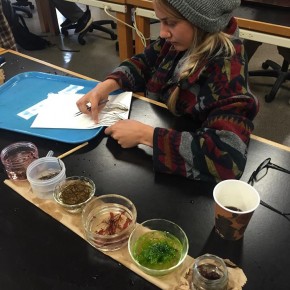 OIMB is committed to assisting students and offers the following scholarships, in the amount of $500 to $1000 each, to students enrolled in OIMB courses.
OIMB is committed to assisting students and offers the following scholarships, in the amount of $500 to $1000 each, to students enrolled in OIMB courses.
Scholarship application (pdf)
Recommendation letters can be e-mailed to OIMB admissions with the application or emailed directly by the writer.
Scholarship application deadlines
March 1 (for spring term)
May 15 (for summer term)
September 1 (for fall term)
Scholarships for Marine Biology Students
The OIMB Alumni Scholarship is available to University of Oregon students attending OIMB.
The Robert C. Terwilliger Fund for scholarships in invertebrate zoology is available to students enrolling in invertebrate zoology (BI 451/551).
The Neil Richmond Fellowship is available, spring or fall, to any enrolled students and is funded by a grant from Oregon Sea Grant to honor the memory of this ODFW scientist.
The Laura Bickerstaff Scholarship is awarded to junior and senior undergraduates attending spring, summer or fall term at OIMB.
The Libbie Hyman Memorial Scholarship is available to support a FIRST field station experience for students taking courses about or doing research on invertebrates – deadline for applications is normally the beginning of March.
NOAA Hollings Undergraduate Scholarship Program provides two years of academic assistance (up to a maximum of $9500/yr.) and a 10-week, full-time internship position ($700/wk.) during the summer at a NOAA facility. You apply during your sophomore year and the application deadline is normally at the beginning of January.
NOAA Hollings 2015 Recipient: Sandra Dorning
Following my graduation from UO/OIMB, I had the great fortune of working as an intern at the Northeast Fisheries Science Center (NEFSC) in Woods Hole, Massachusetts, as part of the NOAA Ernest F. Hollings scholarship program. I spent the summer studying the acoustic behavior of a population of Omura’s whale (Balaenoptera omurai) from off the coast of Madagascar. I learned how to process passive acoustic recordings to target vocalizations of interest and analyze this information to elucidate whale vocalization patterns. At the end of my internship, I joined my fellow Hollings scholars in Silver Spring, Maryland, where we each presented the results of our summer research projects. As part of the Hollings program, I will also present my research at a professional conference during the upcoming school year.
My experience as a Hollings scholar was an incredibly enjoyable and educational one. I had the privilege of working with an incredibly kind and helpful team of scientists at NEFSC, who made my summer particularly memorable. They provided me opportunities to have a wide range of experiences within the field of marine mammal science throughout the summer. In addition to my Omura’s whale acoustics project, I had the chance to go out on the water in Stellwagen Bank National Marine Sanctuary, both to assist with passive acoustic hydrophone deployments, and to work as a marine mammal and bird observer. I also had the opportunity to assist with the necropsy of a bycaught grey seal. I had no experience studying marine mammals prior to this internship, so I greatly valued this chance to learn about and explore my potential interest in cetacean and acoustic research.
NOAA Hollings 2010 Recipient: Nick Hayman
My name is Nick Hayman and I was a 2010 Hollings Scholar. I applied to this scholarship on a whim over Christmas break after I saw an e-mail from the Biology Department. It has turned out to be one of the best decisions I have ever made. Obviously, the amount of money they give each recipient is astounding; two years of a generous stipend as well as a paid internship over your junior summer as long as you keep your grades up. It is hard to beat that. However, not only does NOAA give this generous scholarship, but they actually try to recruit you into their organization; they need the younger generation to keep up their work. Even if you are not interested in working for NOAA, the scholarship’s internship and opportunities to network with top scientists can give you an enormous advantage over many undergraduate biology majors for finding other jobs and going to graduate schools. The people running the program are extremely nice and helpful. There is literally no reason not to apply; the application is not daunting and if you win, the reward is much more than simply monetary. Currently I am in a graduate program at San Diego State University.
